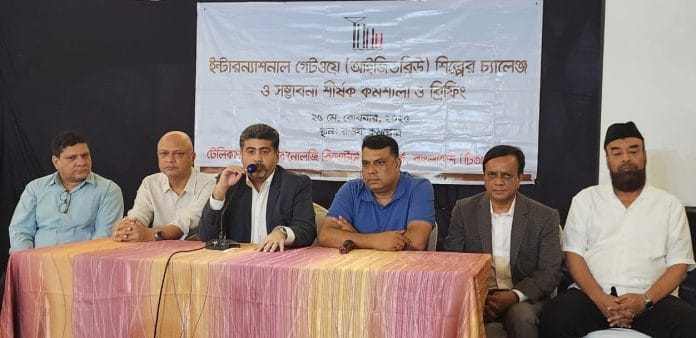Following their involvement in handling international voice calls, International Gateway (IGW) operators are now seeking the opportunity to manage international SMS traffic.
They claim that if allowed to operate in this space, the government could earn Tk 2 billion annually in revenue — eight times more than what it currently receives from mobile operators.
The International Gateway Operators Forum (IOF), representing IGW operators in Bangladesh, has called for allowing local IGW operators to handle International Incoming A2P (Application-to-Person) SMS services.
At a press briefing held today at the RAOWA Convention Center in the capital, IOF leaders stated that if the responsibility for handling international A2P SMS traffic is shifted from multinational corporations to local IGW operators, the government’s revenue could increase up to eightfold.
The event, titled “Challenges and Opportunities in the International Gateway (IGW) Industry,” was organized by Telecom and Technology Reporters Network Bangladesh (TRNB).
It featured prominent speakers including IOF President Asif Rabbani, Vice President Abdus Salam, Brig Gen (Retd.) Md. Khurshid Alam, CEO of Bangla Tel, Brig Gen (Retd.) Md. Abdul Hannan, CEO of Mir Telecom Ltd., and Hasibur Rashid, Managing Director of Novotel. The session was moderated by TRNB President Samir Kumar Dey, and the welcome speech was delivered by its General Secretary Masuduzzaman Robin.
Against the backdrop of proposed changes in the new telecom law, IGW operators are urging the government not to revoke their licenses.
Instead, they are requesting permission to handle international SMS services, which they argue will significantly boost national revenue.
When a call is made from abroad to a Bangladeshi mobile number, it is first received by an IGW operator. The call is then routed through an Interconnection Exchange (ICX) operator before reaching the intended recipient via the mobile operator’s network.
To combat illegal VoIP operations and prevent revenue leakage, the Bangladesh Telecommunication Regulatory Commission (BTRC) introduced the IGW license system in 2008.
At that time, approximately 100 million minutes of international calls were received daily. However, with the widespread use of apps like WhatsApp, Viber, and Messenger, this volume has plummeted to around 10 million minutes per day.

